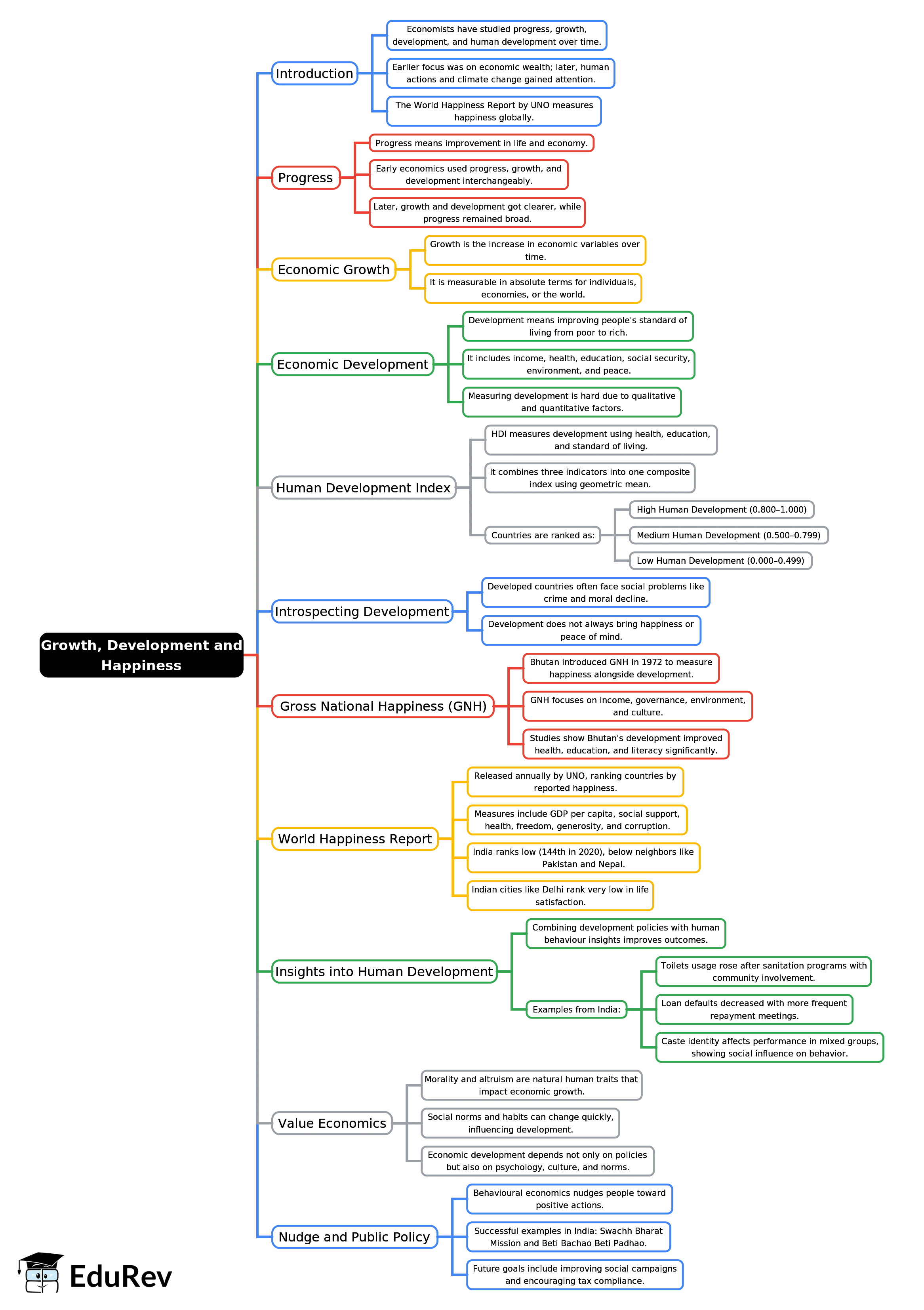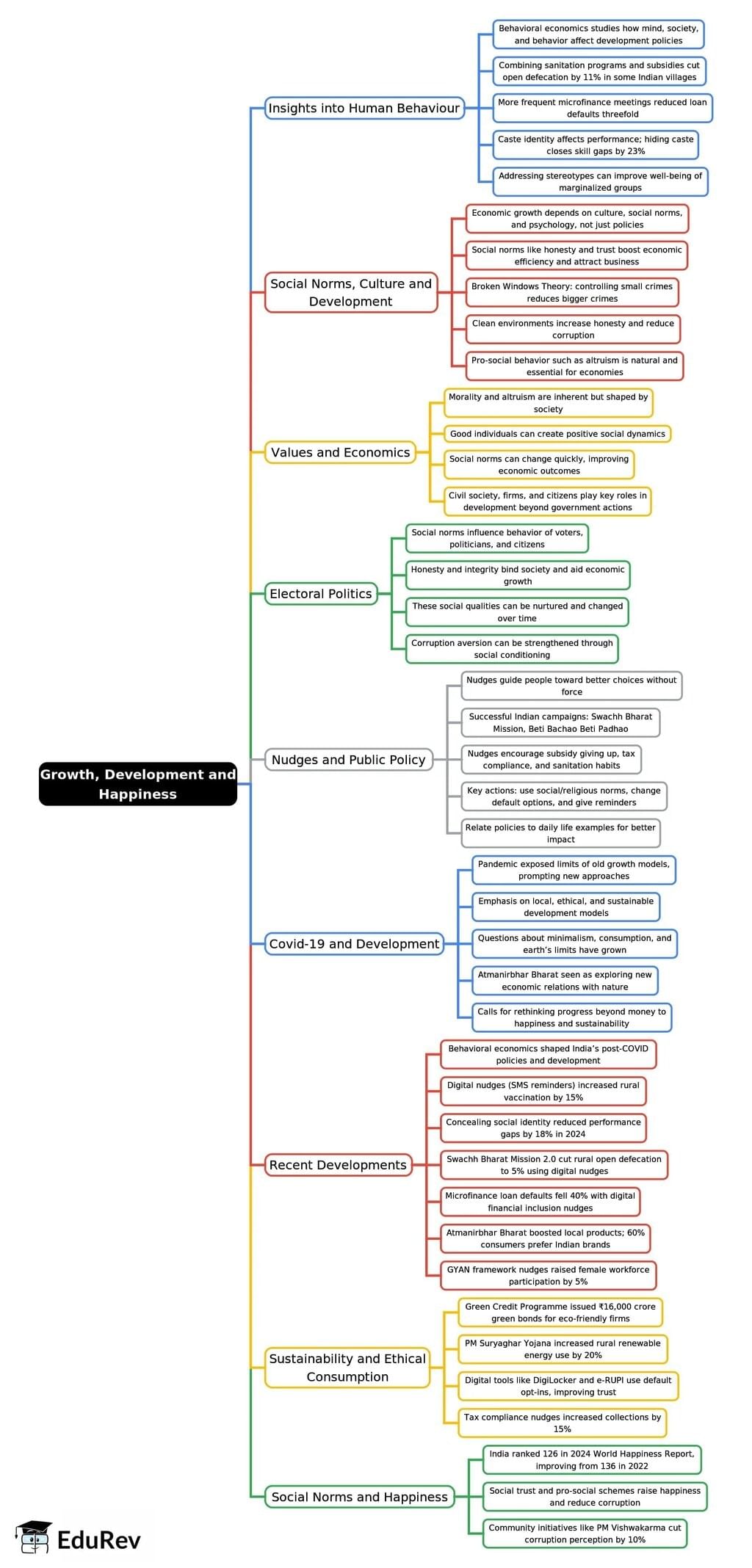UPSC Exam > UPSC Notes > Indian Economy for UPSC CSE > Mind Map: Growth, Development and Happiness
Mind Map: Growth, Development and Happiness | Indian Economy for UPSC CSE PDF Download
Growth, Development and Happiness - 1

Growth, Development and Happiness - 2

The document Mind Map: Growth, Development and Happiness | Indian Economy for UPSC CSE is a part of the UPSC Course Indian Economy for UPSC CSE.
All you need of UPSC at this link: UPSC
|
121 videos|490 docs|159 tests
|
FAQs on Mind Map: Growth, Development and Happiness - Indian Economy for UPSC CSE
| 1. What is the connection between growth, development, and happiness in the context of human well-being? |  |
Ans. Growth, development, and happiness are interconnected aspects of human well-being. Growth typically refers to the quantitative increase in economic indicators, such as GDP, while development encompasses qualitative improvements in living standards, education, healthcare, and social equality. Happiness, often measured by life satisfaction and emotional well-being, is influenced by both growth and development. A balanced approach that fosters economic growth alongside sustainable development can lead to enhanced happiness levels by ensuring that individuals have access to opportunities that promote a fulfilling life.
| 2. How do different cultures perceive happiness, and what impact does this have on development policies? |  |
Ans. Different cultures have varying perceptions of happiness, which can significantly influence development policies. For instance, Western cultures often equate happiness with individual achievement and material success, while many Eastern cultures may emphasize community well-being and social harmony. Understanding these cultural differences is crucial for policymakers to design development initiatives that resonate with local values and practices. By incorporating culturally relevant concepts of happiness, development policies can be more effective in promoting overall well-being and satisfaction among populations.
| 3. What role does education play in the growth and development of individuals and societies? |  |
Ans. Education is a fundamental driver of both individual growth and societal development. It equips individuals with knowledge and skills necessary for employment, enhances critical thinking, and fosters innovation. Societies with higher levels of education tend to experience improved economic performance, reduced poverty rates, and better health outcomes. By investing in education, countries can create a more informed citizenry that contributes to sustainable development and overall happiness, thereby breaking the cycle of poverty and promoting social mobility.
| 4. In what ways can government policies enhance happiness among citizens through development initiatives? |  |
Ans. Government policies can enhance happiness among citizens by prioritizing development initiatives that focus on health care, education, social security, and environmental sustainability. Policies that promote equality and access to resources, such as affordable housing and quality education, can significantly improve individual well-being. Additionally, fostering community engagement and participation in decision-making processes ensures that citizens feel valued and connected, which can lead to higher levels of happiness. Governments can also support mental health initiatives and work-life balance policies that contribute to overall life satisfaction.
| 5. How does economic inequality affect happiness and development in societies? |  |
Ans. Economic inequality has a profound impact on happiness and development within societies. High levels of inequality can lead to social unrest, decreased trust among citizens, and lower overall life satisfaction. When wealth is concentrated in the hands of a few, many individuals may lack access to essential services and opportunities that foster growth and development. Conversely, more equitable societies tend to experience higher levels of happiness, as they promote social cohesion and ensure that all individuals can contribute to and benefit from economic development. Addressing inequality through inclusive policies is crucial for improving overall societal well-being.
Related Searches
















